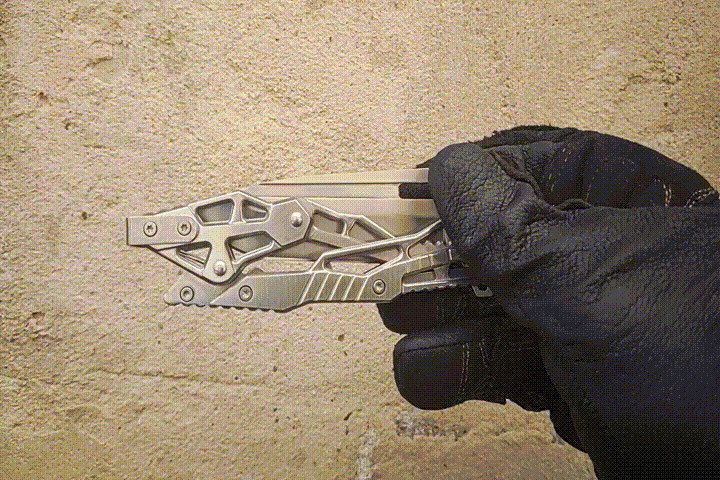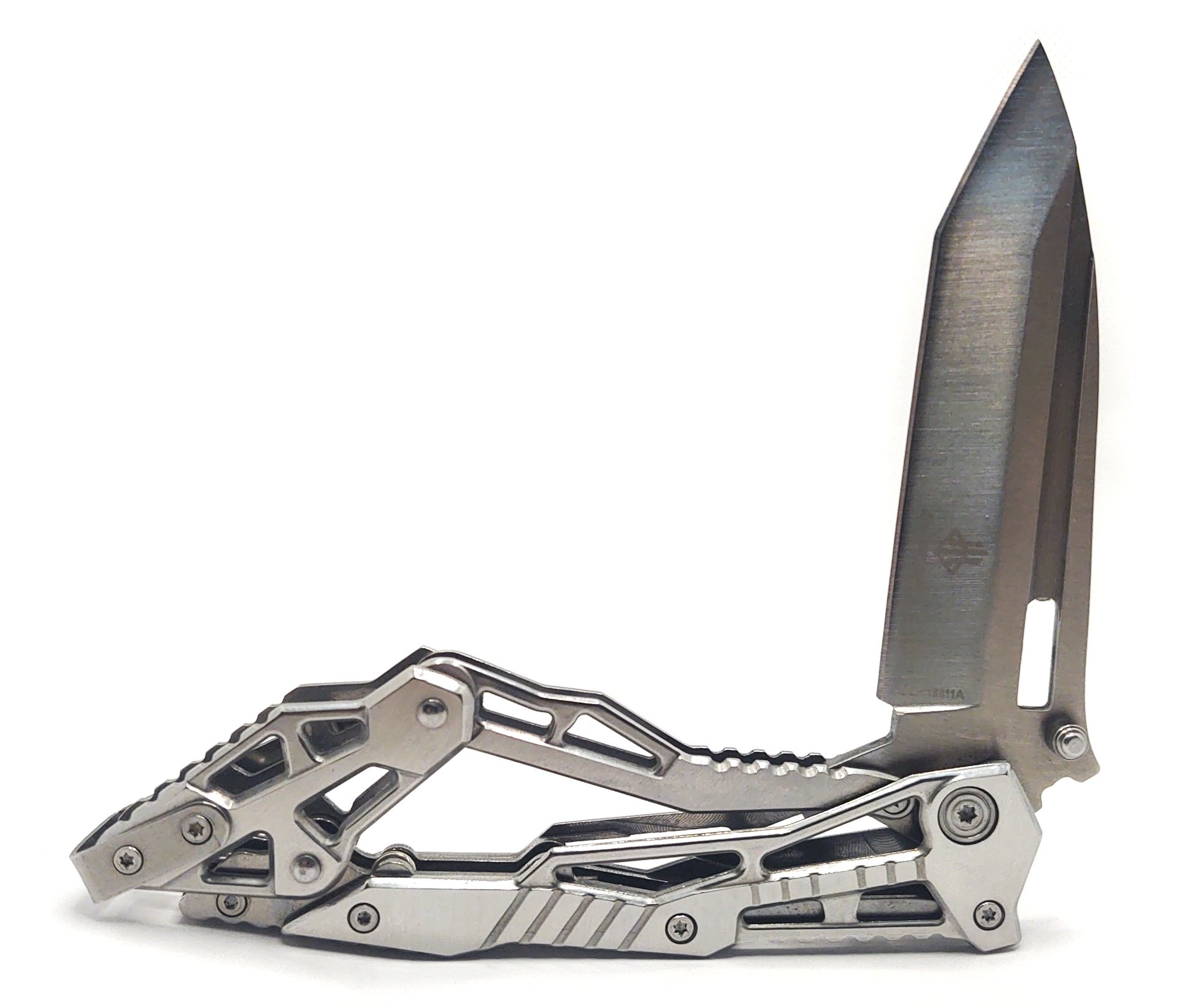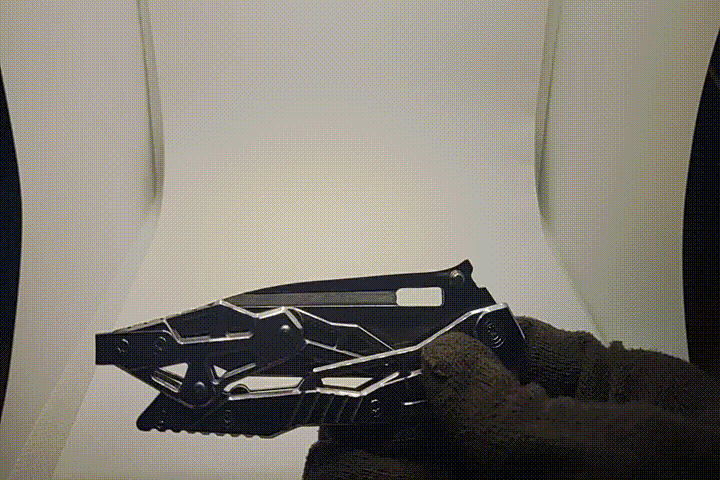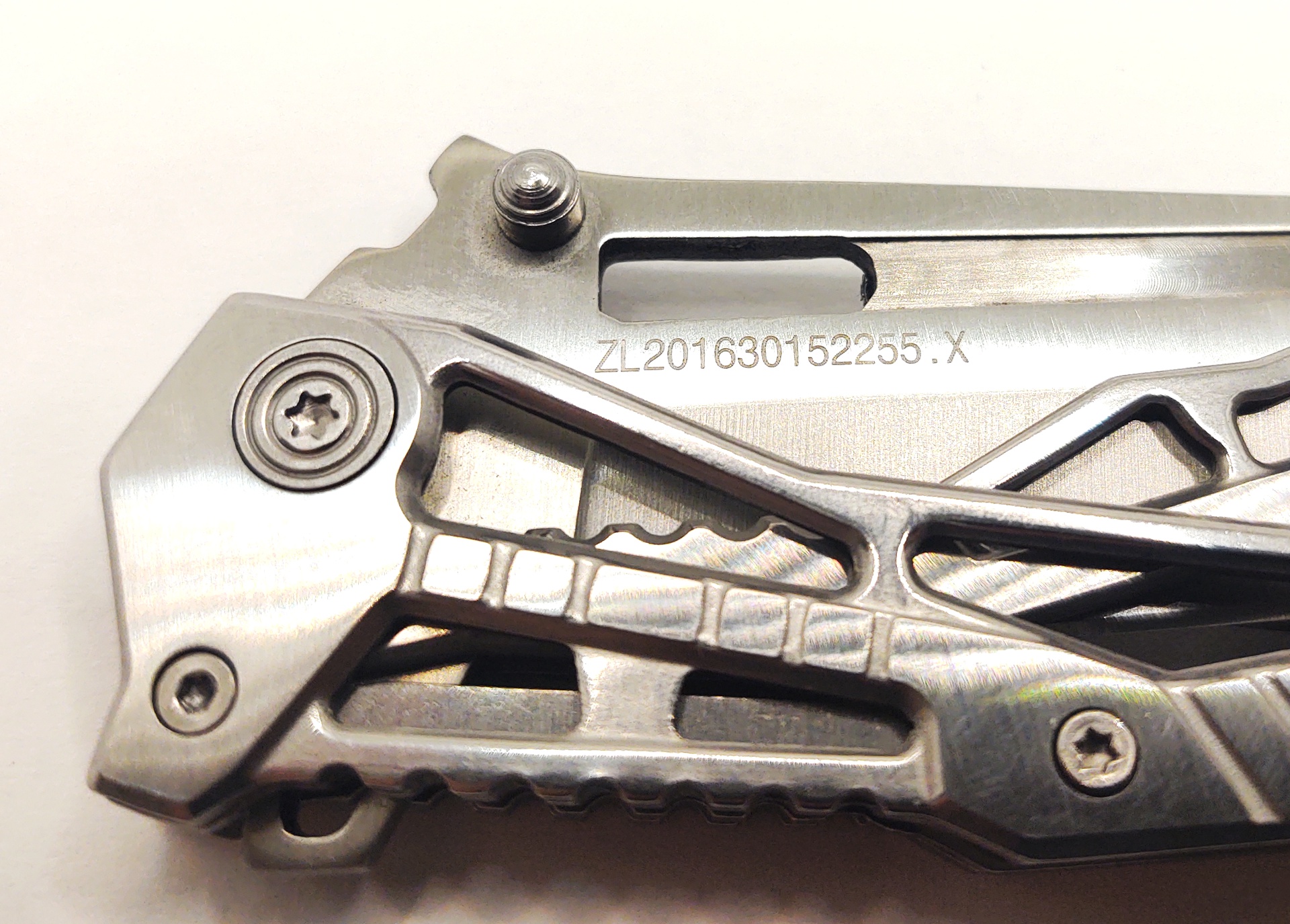Do you feel like your knife hasn’t got enough of a mechanism in it? Brother, have I got a deal for you.

I have seen these kicking around online for a while now and up until lately I’ve ignored them. This one, for instance, cost the suspiciously low sum of $8.28 and was billed as, and I quote: “New High-Quality Antler Stiletto Knife Folding Camping Knife Automatic Knife Spring Knife Outdoor Survival Knife.”
Antler? False. Stiletto? No. Automatic? Not that either, as we’ll see. Spring? Well, there is one in there but it doesn’t do what I think they’re implying. Already we’re off to a rough start.

But. I did perchance to spy in the pictures on its listing this logo, one which we now know very well. So far we’ve looked at two other Jin Jun Lang knives and been pleasantly surprised. So I bought one a while ago. Will we manage to score a hat trick?
Actually, speaking of tricks. Let’s just cut out all that talking and skip right to the money shot. Here’s how this knife works. Not all of that skeletonized steampunky nonsense is there just for looks.

You are now thinking to yourself one of two things. You’re either thinking, “Wow, that’s dumb.” This is because you are a normal person. Or, if your immediate thought was, “That’s rad,” well. Turns out you’re one of us.
(Ed: This action actually turns out to be more-or-less lifted from the Kershaw ET, which is now unobtanium. Examples from various other brands by and large using a similar action may, or in fact may not, also exist.)

Never mind all that antler-stiletto-automatic crap. This is, completely unremarked upon by its seller, a Jin Jun Lang model JL-16011A. (There is also a “B” variant, which is black.) The family resemblance to the other JJL knives we’ve seen is clearly evident.
The JL-16011A is a fairly large 8-1/4" long open, 4-7/8" closed, and has a 3-1/2" long tanto pointed blade (measured from the forward edge of the handle as usual) that’s hollow ground. It’s made from an upsecified grade of stainless steel (3cr most likely, 5cr maybe, 7cr less so) as is the rest of the knife. This knife is so metal that if it had an album cover it’d feature, like, ten skeletons. Minimum. It weighs 144.4 grams, 5.09 ounces, which is to say it’s a lot to be hanging off your pocket.

To assist in this it has a deep carry pocket clip. No, really, it does. The clip wraps all the way around the knife from one side to the other, and rides on the rear half of the articulating mechanism. It is not reversible, though.

The understated styling on the deep carry clip, at least compared to the rest of the knife, means no one will know just what kind of malarkey you’ve got in your pants.

And because there are so many pivots and clearances inherent in the design, it’s very thick. 0.608" without the clip, or 0.722" with it. Yes, going on for three quarters of an inch. The blade is 0.110" thick as usual, which seems to be a common thickness for steel stock.
Right. So all that aside, mechanically this knife is a very odd duck.

It has no lock, at least in the traditional sense. There is a long armature with a pivot through the heel of the blade, offset from the main one. When you deploy the blade this is pushed back, and then pulled forward as the blade goes 'round its arc, like the drive arm on a locomotive. This also causes the block at the rear to tip up and then down. All told there are four pivots in the chain, and at the end of the blade’s travel both the armature and the block rest home against the handle with a noticeable click.

After this point it is impossible to rotate the blade back towards the closed position because the pivot between the rear block and the armature has gone over-square, so to speak, and doing so would just push the armature further against the handle. You unlock it by pressing on the rear block, which pushes the armature up out of this position and starts to pivot the blade rearward.
Opening it is a bit of a fiddle because there is a lot of drag caused in all those pivots. Plus, there is a clothespin spring under the rear block which makes it want to naturally spring back into its rest position:

So it takes quite a shove to open this one handed via the usual method, using the (ambidextrous) thumb studs. And just to add a little spice to your life, part of the opening action opens up a big hole between the armature and the nonmoving part of the handle, which tends to deliver a pinch right to your palm when you lock the blade open.
But I know what you’re thinking. You could totally open this by just mashing down on the rear block, right?
Right?
Well, about that.

The finesse and timing required definitely takes practice. The penalty for failure is that the clothespin spring will case the blade to snap back shut, and it will bite you. Even so, you still need two hands. But it’s rewarding to finally get it right.
That’s not to say that it’s a practical way to open it by any stretch, though. In fact, I’m not sure there is a practical way to open it, other than with two hands: One on the blade, one on the block.

The JL-10611A is big. Decidedly, obviously, flagrantly large. And it’s wide and broad and heavy, too.

Nobody would carry this except for ironic and frivolous purposes. The best purposes.
Now, I’m not going to take it apart. Much of the mechanism is riveted together, so I’m not sure we’d see much other than watching me struggle to put the spring back in. All of the pivots do ride on brass washers, which are just visible if you peer at it from the sides. Except for the main blade pivot, which has what appear to be PFTE washers in it – not that it matters much.

As we saw on the JJL slingshot knife, this thing bears a Chinese patent which is proudly displayed on the reverse of the blade:

It also bears the Jin Jun Lang logo as we’ve seen, and its model number. There are no other markings – not even a perfunctory “Made in China.”

The blade grind is okay, but not great. It has what I think could best be described as functional sharpness out of the box.

Disappointingly, the grind is actually noticeably out of true from the factory unlike the last two JJL knives we inspected which is a bit of shame.
The Inevitable Conclusion
I think this is a meant to be a toy for fiddling with, not a tool for using. But that said it’s reasonably well built and certainly doesn’t cost very much, albeit with a design that’s really a hindrance to usability even if it is, on paper at least, clever. So maybe it’ll be a fun little lighthearted novelty addition to your collection rather than spending $300 on the next Benchmade. That’s not to say it’ll be as good as your next Benchmade. It won’t, clearly. That’s not why it exists.
I have one. I guess it was cool for $10 but I wouldn’t recommend it, even to fiddle with. I’ve cut myself several times with it. It’s a really bad design.
OK but where’s the link to get it for $8?
https://www.wish.com/product/6131e07f2242a3710ddaa61f
This comes with an asterisk about the size of a manhole lid: It does involve doing business with Wish. I see the price has now risen to $9.36 (plus the usual tacked-on shipping charge) but I bought mine several weeks ago.
Black and silver version looks pretty sick. Jin Jun Lang 16011L.
Fun read, thanks for posting. Very thoughtful writeup and nice pictures.


